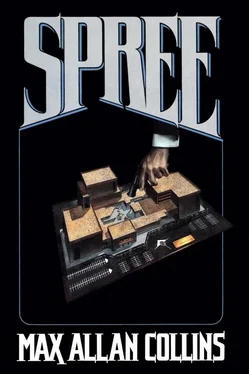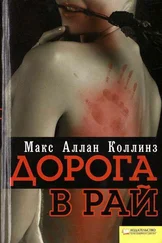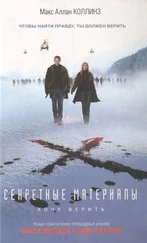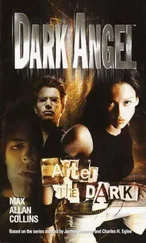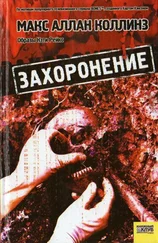Макс Коллинз - Spree
Здесь есть возможность читать онлайн «Макс Коллинз - Spree» весь текст электронной книги совершенно бесплатно (целиком полную версию без сокращений). В некоторых случаях можно слушать аудио, скачать через торрент в формате fb2 и присутствует краткое содержание. Город: New York, Год выпуска: 1987, ISBN: 1987, Издательство: Tor Books, Жанр: Криминальный детектив, на английском языке. Описание произведения, (предисловие) а так же отзывы посетителей доступны на портале библиотеки ЛибКат.
- Название:Spree
- Автор:
- Издательство:Tor Books
- Жанр:
- Год:1987
- Город:New York
- ISBN:978-0-312-93029-5
- Рейтинг книги:3 / 5. Голосов: 1
-
Избранное:Добавить в избранное
- Отзывы:
-
Ваша оценка:
- 60
- 1
- 2
- 3
- 4
- 5
Spree: краткое содержание, описание и аннотация
Предлагаем к чтению аннотацию, описание, краткое содержание или предисловие (зависит от того, что написал сам автор книги «Spree»). Если вы не нашли необходимую информацию о книге — напишите в комментариях, мы постараемся отыскать её.
Spree — читать онлайн бесплатно полную книгу (весь текст) целиком
Ниже представлен текст книги, разбитый по страницам. Система сохранения места последней прочитанной страницы, позволяет с удобством читать онлайн бесплатно книгу «Spree», без необходимости каждый раз заново искать на чём Вы остановились. Поставьте закладку, и сможете в любой момент перейти на страницу, на которой закончили чтение.
Интервал:
Закладка:
During his freshman year, he’d met Phil, who’d invited him up to his apartment; they had met in a pizza place and found a mutual interest in what was then called “hi-fi” equipment. Phil invited him up to show him the latest in hi-fi, and to listen to Kingston Trio records — in stereo, no less. Unfortunately, Roger soon found that the hi-fi stuff was the equivalent of etchings, and he had to set Phil straight about some things.
Phil had apologized profusely, saying he’d misread Roger and was so very sorry, so very embarrassed; and they’d become friends. Roger didn’t much care about Phil’s sexual bent. Roger’d had his own secrets. One of which was that he’d been a shoplifter for as long as he could remember.
He had shared this secret with Phil, one evening when they were both in their cups; and Phil, who already had a hole-in-the-wall locksmithing shop, admitted he had certain criminal leanings himself. He’d done time, in fact. That was where his homosexual leaning had flowered, Roger gathered. Anyway, Phil had used his locksmithing abilities on a number of burglaries, back in St. Louis where he’d grown up; he’d been involved with a ring that broke into stores and businesses. Phil used to work with a pete-man — safecracker — named Harvey Watters; they’d lived together for a time. But Watters was “inside,” as Phil put it.
Watters had taught Phil a lot about the safecracking business, but Phil didn’t have the nerve for it — specifically, for making the necessary grease — that is, the nitro — and working with knockers (detonators) and explosives in general.
But Roger had no such fears — the Fourth of July was his favorite holiday — and through Phil, Watters’ expertise was passed on to Roger, who in the meantime had lost his scholarship and was expelled from Drake when he was caught cheating on his chemistry finals.
And so they had begun, through Phil’s St. Louis contacts and a few others right there in Des Moines, doing jobs. Three or four or five times a year. Roger was a natural pete-man and, despite the relative infrequency of their jobs, gained a real reputation in the trade. He and Phil made a lot of money. Soon they had expanded the locksmithing shop and had a healthy legit business going.
They always planned to phase out their “other” profession, but they had never quite got around to it.
Because what Roger and Phil had in common, besides hi-fi and business and crime, was a love of gambling. Gambling was the only part of Roger Winch’s life, besides crime of course, that couldn’t be classified as safe. He and Phil — on three or four times a year “convention” trips — went to Vegas or Tahoe or Atlantic City, and played high-roller. They tended to go their separate ways — Roger concentrating on blackjack, and Phil on roulette. Now and then one of them came home a winner. Frequently neither did.
At the moment, Roger’s savings account (he couldn’t speak for Phil) was flatter than a blackjack dealer’s ass. It needed replenishing, to say the least; Doris — Roger’s wife — was oblivious to their finances, but he had promised her that condo in Florida, and unless he came out of semi-retirement, criminally speaking, and made a score, he’d have to disappoint her, and that was one thing Roger didn’t want to do.
Neither he nor Phil had done a job in a year and a half. They were getting older (Phil was sixty) and, Roger’s gambling losses aside, had built comfortable lives for themselves. Their locksmithing business was tops in town, and could be sold for a nice piece of change, when they went into retirement, a few years from now, something they were already discussing.
But Phil, Roger could tell, missed the excitement of doing a job; Phil might not have had the stones to handle explosives, but he obviously loved night work: unlocking doors and going in places and taking things. And there was, Roger had to admit, a thrill to it. There were, Roger could not deny, few things sweeter than seeing the door of a safe, which you’ve punched or blown, swing open.
But the business had changed. There just wasn’t as much work as there used to be. Oh, it wasn’t technology — changes in safe design were no big deal — nitro can beat any style of vault; and being in the locksmithing business gave them access to all the inside info for the finer points.
But too many safes these days were out in full view, floodlit at night, often near windows at the front of stores, where the cops could see you working. And the credit card was putting pete-men like Roger out of business, anyway: there just weren’t as many cash transactions as there used to be. Also, businesses routinely used bank night depositories, rather than stick the day’s proceeds in an on-site safe. So even if you could get to the safe, there wouldn’t likely be much in it.
So Roger, broke, frustrated, was pleasantly surprised to receive the phone call from Cole Comfort, of all people.
“It’s a big job,” he said. “We need you and your pansy pal, too.”
“Don’t say that,” Roger said.
“Say what?”
“Don’t say anything unkind about Phil. He’s a real gentleman, and I expect you to treat him that way.”
“Why, of course. No disrespect meant. We need his special talent — there’s going to be lots of doors that need unlocking.”
Hearing Comfort’s soothing, southern-accented tone made Roger queasy; the man was a liar, and a small-timer to boot. Roger couldn’t think of Comfort without thinking of heisting grocery stores, loading frozen meat into trucks. A nickel-and-dimer, Comfort was, and a dangerous one.
“I don’t know, Cole,” Roger said, wanting very much to take the job, but not feeling it prudent.
“It’ll be fifty gees each, minimum,” he said.
“Hmmm.”
“It’s an inside job. Very safe. More than that I dare not say.”
“Who else is in?”
“Nolan.”
That decided it.
“Count me in,” Roger said.
“How about the... your pal?”
“He’s in.”
“You can speak for him?”
“I can speak for him.”
Now it was a week later, in Davenport, Iowa, in the restaurant/nightclub called Nolan’s. It was just past three o’clock in the morning. They had come in two cars; he and Phil had been picked up downtown, at the Hotel Davenport, where they shared a room (he had no qualms about sharing a room with Phil — Phil never fooled around on the job). Cole Comfort himself had been driving, a blue Ford pickup; Roger sat next to driver Cole, and Phil sat next to Roger. In the other car were the three Leech brothers (as it turned out) and Dave Fisher, the slightly nerdy electronics guy.
They sat at a big table in the dimly lit bar area of Nolan’s. Nolan himself, in a pale blue shirt and dark new-looking jeans, stood off to one side, leaning against a pillar, among hanging plants, lurking in the foliage like a jungle cat. Cole Comfort sat at the head of the table, a white-haired, blue-eyed near coot in a plaid shirt and overalls. Overalls, God help us. Roger glanced at Nolan, wondering why the man would lower himself to work with Comfort. Nolan, as usual, was expressionless.
Next to Roger was Phil, looking professorly in a tweedy brown sport jacket over a sweater-vest and tie; sitting like a student next to him was Fisher, a serious, earnest man in his late thirties, wearing thick glasses with heavy black frames and a white shirt and black tie with pens and gizmos in a plastic pouch within his shirt pocket, a pocket-size notebook on the table in front of him. Across from them were the Leech brothers — Ricky, Jerry, Ferdy — three lumberjack-brawny guys in their late thirties with five-o’clock shadow and dirty sweaters and stocking caps, which they were wearing indoors, just as they were wearing the same blank-eyed expression. They were triplets. No one on earth, outside of their family, could tell them apart.
Читать дальшеИнтервал:
Закладка:
Похожие книги на «Spree»
Представляем Вашему вниманию похожие книги на «Spree» списком для выбора. Мы отобрали схожую по названию и смыслу литературу в надежде предоставить читателям больше вариантов отыскать новые, интересные, ещё непрочитанные произведения.
Обсуждение, отзывы о книге «Spree» и просто собственные мнения читателей. Оставьте ваши комментарии, напишите, что Вы думаете о произведении, его смысле или главных героях. Укажите что конкретно понравилось, а что нет, и почему Вы так считаете.
